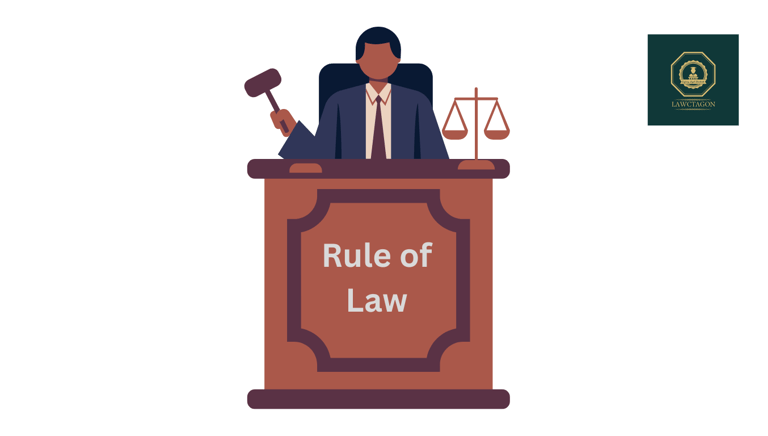Rule of Law
In this blog the concept of rule of law is explained. It's meaning, modern concept, rule of law under Indian law is discussed in this blog.
Divyam Bhatia from Institute of Law, Kurukshetra University
3/28/20248 min read


Rule of Law
Introduction
It is basically a norm which talks about principles of legality and supports the equality of all the citizens before the law. Rule of law firstly applied in the English Constitution on which even in today’s scenario the rule of law is the basic principle of English Constitution. This doctrine has been enshrined in the Constitution of U.S.A. and in the Constitution of India. The whole administrative law is based on the concept of rule of law. Sir Edward Coke, Chief Justice in James I’s reign, is the originator of this principle. Ina battle against the King he succeeded in maintaining that the king must be under the god and the law, thus he successfully shows the supremacy of law against the executive. Prof. Dicey had developed this doctrine in his book ‘The Law and the Constitution’.
Meaning
Acc. to Dicey, the rule of law is the basic principle of English legal system. He attributed three meanings of this doctrine:
i) Supremacy of Law;
ii) Equality before Law;
iii) Predominance of legal spirit
Supremacy of Law – Acc. to Dicey, rule of law means the absolute supremacy of regular law as opposed to the influence of arbitrary power or wide discretionary power. It excludes the existence of arbitrariness, of prerogative power. He also claimed, “wherever there is discretion, there is room for arbitrariness and that in a republic no less than under a monarchy discretionary authority on the part of government must mear, insecurity for legal freedom on the part of its subjects”.[1] Accordingly Wade[2] also says, “The rule of law requires that the government should be subject to the law, rather than the law subject to the government.”
Equality before law – Acc. to Dicey, there must be equality before the law or the equal subjection of all classes to the ordinary law of the land administered by the ordinary law courts. In England, all the persons are subject to one and same law, no special courts for government officers or other officials. Acc. to him, the courts are supreme throughout the state. In this context, he critisizes about the French legal system, where there were special courts for settling disputes between government officials and ordinary people.
Predominance of Legal spirit – Acc. to Dicey, In England, the judicial decisions of the courts, are based on the general principles of the Constitution. In many counties, rights are guaranteed by a written constitution and in England it is not so. These rights are the result of Judicial decisions to decide the cases. The constitution is not the source of rights of the individuals. Dicey sys, if the source of fundamental rights of the is any written constitution, then the right can be abrogated at any time by amending the Constitution. In this way rule of law shows judicial supremacy.
Modern Concept of Rule of Law
The modern concept of rule of law is wide. Acc. to Davis[3], there are 7 principal meanings of the term rule of law,
i) Law and Order;
ii) Fixed rules;
iii) Elimination of discretion;
iv) Due process of law and fairness;
v) Natural law or observance of the principles of Natural Justice;
vi) Preference for judges and ordinary courts of law to execute authorities and administrative tribunals;
vii) Judicial review of administrative action.
Rule of Law under the Indian Law
The rule of law is really important for a democracy. It means that everyone, including the government, has to follow the rules set out in the constitution and the law. This idea is woven into every part of the constitution, making it one of the most important aspects of how the country is run. It means that every part of the government can only do what the law says it can. The rule of law applies to everything the government does.[4]
Law in the context of the rule of law does not mean any law enacted by the legislative authorities, however arbitrary or despotic it may be………what is necessary element of the rule of law is that law must not be arbitrary or irrational and it must satisfy the test of reason and the democratic form if the polity seeks to ensure this element by making the framer of law accountable to the people.[5]
Every organ of the administration is regulated by the rule of law. The Indian Constitution embodies the modern concept of the rule of law and it exists in this country by virtue of the following features:
i. Supremacy of the Constitution – The constitution is supreme and all the three organs of the government, that is legislature, executive and judiciary are subordinate and have to act in accordance with it. If the executive or the government abuses the powers or take any action with mala fide intention, then it can be quashed by the judiciary. All the rules and regulations must be made in accordance with the constitution, if they are inconsistent or contrary to the any provision of the constitution they can be declared ultra-wires by the supreme court or the high court.
ii. Equality - Equality before law, one of the principal of rule of law, which has been accepted and adopted under article 14 of the constitution. The maxim the king can do no wrong has no application in India. Even the government and public authorities are subject to the jurisdiction of courts of law and can be tried and penalized for their wrongs, they are subject to ordinary legal process.
The absence of arbitrary power is the first postulate of the rule of law, upon which our whole constitution is based. It is amount to the antithesis of rule of Law, if the discretion is exercised without any principle or without any rule.[6]
iii. Enforcement of rights - there are certain rights enshrined in the constitution for the people of India and upon their violation, they can be enforced the courts. Fundamental rights enshrined under part III of the constitution are available for the people or citizen, as the case may be. If they are violated they can be enforced under article 32 and 226 of the constitution.
iv. Rule of law as a feature of basic structure – In Keshvananda Bharti vs. State of Kerala,[7] the judges constituting majority were of the opinion that the rule of law was an aspect of the doctrine of basic structure of the constitution, which even plenary power of parliament cannot reach to amend.
There is a good discussion about the rule of rule of law, In Indira Nehru Gandhi vs. Raj Narain,[8] in this case supreme court invalidate the clause (4) of Article 329-A inserted in the constitution to immunize the election dispute to the office of Prime Minister from judicial review. In the opinion of judges, this was in violation of concepts of basic structure and offends the concept of rule of law.
In this way the decisions of these cases provides a distillation of Indian Judicial thought on the conceptions of rule of law.
v. Elimination of arbitrariness, and not of discretion – Discretion is essential for the viability of any political system. The only important aspect is misuse of discretionary power. Discretion is principal source of creativeness in government and in law, it therefore becomes necessary to confine structure and check discretion in order to uphold the principles of rule of law in administration, so that the discretionary power should not be misused. As Justice Mathew has said in Indira Nehru Gandhi vs. Raj Narain, that there is in the world no government or legal system which has no discretion. It is not possible that a government may be composed of law alone, but not of men and those men may not be given discretion. All the governments are composed of law and men. The needs of modern government are to make wide discretionary power inescapable.[9]
Accordingly explaining the concept of rule of law in Supreme Court Advocates on Record Association vs. Union of India,[10] the Supreme Court laid down that rule of law does not rule out existence of discretionary power completely. In this case, the court held the view that vesting of absolute power in one individual is not warranted under the constitutional scheme. For the rule of law to become realistic, there should be room for discretionary authority within the operation of the rule of law even though it has to be reduced to the minimum extent necessary for proper governance and within the areas of discretionary authority, the existence of proper guidelines for norms of general application excludes any arbitrary exercise of discretionary authority. In such a situation, the exercise of discretionary in its application to individuals, according to proper guidelines or norms further it is the area of discretion but to that extent discretionary power has to be given to make the system workable.
vi. Fairness in action - One of the most important element for the rule of law is the requirement and enforcement of fairness in the action of administration. It is a fundamental principle in the administrative law that requires decision-makers to follow fair procedures when making decisions that affect the rights, interests, or legitimate expectations of individuals or groups. Procedural fairness is particularly important in administrative law because many decisions made by public bodies have a significant impact on the lives of individuals and communities. These decisions can include things like granting or denying a permit, approving or rejecting an application for benefits, or deciding on the course of action that affects the public interest.
Conclusion
Rule of law seems to be a necessary element for a democracy in today’s scenario, which ensures accountability, credibility and fairness in the government functioning and other organs of the democracy. It prevents the misuse of power by any public authorities. It ensures the equality among all the people of the country. No one shall suffer as a result of the arbitrariness of another. All the authorities and organs discharge their duties in accordance with the rules and regulations.
References
[1] Dicey, Law of the Constitution, 8th ed. P 198.
[2] Administrative Law, 1988, p. 24.
[3] Administrative Law, 1959, pp, 24-27.
[4] A.K. Kralpak vs. Union of India, AIR 1970 SC 150.
[5] Bachan Singh vs. State of Punjab, AIR 1982 SC 1336.
[6] Som Raj vs. State of Haryana, (1990) 2 SCC 658-59.
[7] AIR 1973 SC 1461.
[8] AIR 1975 SC 2299.
[9] Davis, Discretionary Justice (1969).
[10] AIR 1994 SC 268.


